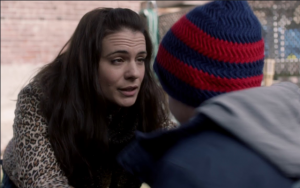LUBA: 2 ½ STARS. “a REAL-LIFE DRAMA WITH A fly-on-the-wall documentary feel.”
 “Luba” is a gritty family drama about a single mom’s struggle to juggle parenting, work while a drug addicted soon-to-be ex-husband complicates life for everyone.
“Luba” is a gritty family drama about a single mom’s struggle to juggle parenting, work while a drug addicted soon-to-be ex-husband complicates life for everyone.
Bartender Luba (Nicole Maroon) moved to Toronto from British Columbia after her mom died, met and married Donnie (Vladimir Jon Cubrt, who also wrote the script). “He was a bar rat,” she says, “and we partied like animals. I slowed down. He didn’t and when he found out I was pregnant he went off the rails.” When Donnie lands in jail on drug charges, Luba is suddenly a single mom to two-year-old Matty (Porter Schaefer), forced to find her own way in the world.
Six years later Luba is struggling to make ends meet as Donnie reappears, clean and sober. Luba reluctantly allows him back into Matty’s life, but as Donnie slips back into old habits, his behavior endangers the whole family. “I’m going to start doing bad s**t again,” he says. To protect Matty and her own future, Luba must confront Donnie’s deepest insecurities.
Despite a chirpy coda that shows us the latter part of Luba and Matty’s journey, “Luba” is not an uplifting movie. The naturalism of the lead performances and immediacy of Caley Wilson’s direction lend the film a fly-on-the-wall documentary feel that wallows in the seemingly unending downturns in the character’s lives.
As unsparing as it is, “Luba” gives us a reason to care about what happens to the characters. Maroon brings the low-level sense of desperation that hangs over Luba like the Sword of Damocles to life as she tries to navigate motherhood, a work life and several unsuccessful romantic interludes.
Cubrt supplies the film’s grit, showing how Donnie’s addiction has grown out of control, as though it is a force beyond his control. When it becomes clear his drug problems are likely to come to a tragic end, both for him and his son, Cubrt takes pains to show Donnie’s humanity. He’s wrong headed and dangerous but he isn’t a monster, just someone who is no longer in charge of his thoughts and actions.
“Luba” deals with sensitive subjects but never feels exploitive. The documentation of the downward spiral of poverty and drug addiction has elements of melodrama, particularly in the film’s final third, but strong characters ensure that “Luba” is more than mere voyeurism.
